Welcome
....to JusticeGhana Group

JusticeGhana is a Non-Governmental [and-not-for- profit] Organization (NGO) with a strong belief in Justice, Security and Progress....” More Details
RAWLINGS REBUKES FRANCE OVER MUGABE
- Details
- Category: Current Issues
- Created on Wednesday, 15 April 2015 00:00
- Hits: 3632
 RAWLINGS REBUKES FRANCE OVER MUGABE
RAWLINGS REBUKES FRANCE OVER MUGABE
Ghana’s former President, Flt Lt Jerry John Rawlings has in a meeting with former Mozambique leader, Joachim Chissano, criticized France for its audacity to question the decision by African leaders to elect Zimbabwe’s Robert Mugabe as Chairman of the African Union.
President Rawlings said it beat his imagination that Francois Hollande had the audacity to send delegations to Francophone countries to query African heads as to why Mugabe was elected AU Chairman.
He said: “And when they are told he (Mugabe) is a man we are proud of because he has a historical memory of where we come from, to remind us of what we should be doing and where we should be going then their names are mentioned by Hollande as African heads of questionable character.
The formerMozambique leader was in Ghana at the invitation of the University of Development Studies (UDS) to deliver a series of lectures.
President Rawlings said former African leaders and other eminent persons had been a little too silent for far too long on very painful issues especially at theAfrican Union level.
“Those of us on this continent are the ones paying the highest price for some of the global changes that are taking place. I suggest we create an opening for some of the bold statesmen and women on the continent so that the voice of Africa can be heard.
“We are being herded into a situation where we are losing our patriotic passion and being assimilated by the so-called international way of doing things. That way ofdoing things runs counter to our interests as Africans,” President Rawlings said.
NIGERIA
Touching on the recent election of General Mahamadu Buhari as President of Nigeria, President Rawlings said he was hopeful that the new leader would put in place a government of integrity to further heighten the renewed energy level in Nigeria.
President Rawlings denounced the state of self-denial of Africans, pointing out that General Buhari originally emerged on the Nigerian political landscape in order to prevent a very violent volcanic eruption similar to what Ghana experienced in 1979.
He said it was one of the reasons why Ghanaians were thrown out of Nigeria by the Shagari administration with the belief that the December 31 Revolution will disintegrate.
“But the revolution was here to stay. The pervasive climate of corruption in West Africa then, is what was provoking these revolts. As a result a lot of governments felt extremely threatened and Buhari had no choice but to emerge and take over.”
“It is unfortunate”, the former President stated, “that some of the Western media will want to call Buhari a former military dictator who overthrew a democratically elected government. That is not the case. He had no choice but to move in. If he hadn’t done so subordinates further down the line would have stepped in.”
President Rawlings added that in spite of Buhari’s leadership of integrity even at that time the atmosphere in Nigeria was loaded and very pregnant to revolt. It was therefore not a surprise that Babangida had to step in to establish the AFRC after ours.
President Chissano said he had complimented outgoing leader, Goodluck Jonathan for conceding the election as it helped to cool down tensions and commended President Rawlings for setting the tone in 1999/2000 when he accepted the outcome of the elections and handed over to a new leadership peacefully. Hesaid General Buhari was disciplined while in office and he was expectant that he will bring back that standard.
Present at the meeting were Nana Konadu Agyeman-Rawlings, former Foreign Minister Victor Gbeho and officials of the UDS.
Source: JJR WordPress
How important is gender in conservation?
- Details
- Category: The World
- Created on Sunday, 05 April 2015 00:00
- Hits: 7898
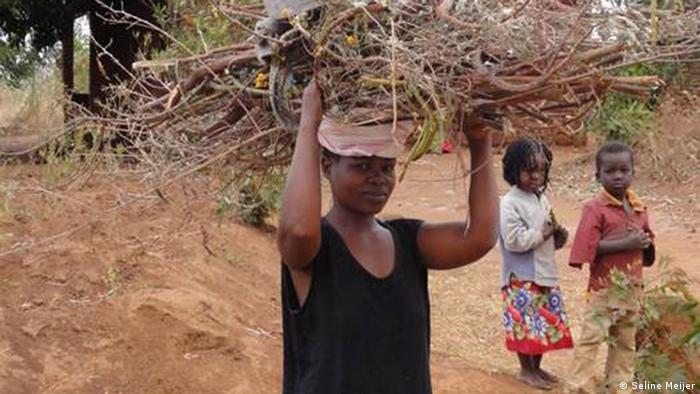 How important is gender in conservation?
How important is gender in conservation?
Could paying greater attention to gender roles help save the environment? Ever more environmental groups believe it can. Some examples from practice - like reforestation in Malawi - indicate this is indeed the case.
When local farmers in Malawi plant trees, a separation of labor is clear: While the farmer plants the small seedlings, his wife takes care of older trees, sweeps away old leaves from the ground, collects firewood for cooking and harvests the fruit.
Gender obviously plays a huge role in life - and also for conservation. Scientists and environmental organizations are now starting to paying attention to exactly what makes up these differences.
What's emerging is not only important for conservation - it's also a bit surprising.
Gender matters
Conservation International recently even created a job position dedicated to looking at gender aspects in conservation. Kame Westerman, advisor for gender and conservation, is convinced that gender is key - especially in conservation projects that take place on a grassroots, community level.
"Men and women use natural resources differently," Westerman told DW. "That's due to roles and responsibilities, and the different things that men and women do in their lives."
The main issue: Although women in local communities do take over crucial tasks relating to conservation, they are easily overlooked in the decision-making process, Westerman says.
In many communities women might not traditionally be included in the decision-making elite of a community - yet it's usually these leaders that outside environmental organizations and researchers first address.
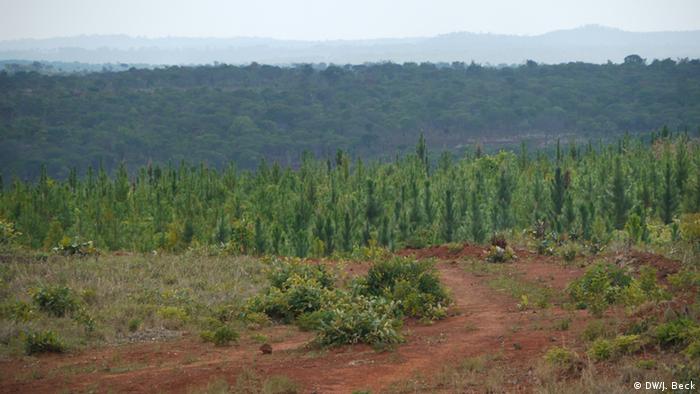
Failure is easy
Ignoring women or not considering gender roles is the easiest way to let a project run to ruin, Westerman thinks.
By way of example, she refers to a conservation organization that tried to reduce deforestation in a community where men were in charge of harvesting trees. The conservationists tried to find another source of income for men to stop the deforestation, so men were taught how to farm and harvest vanilla instead.
But it didn't work out - after several bad harvests, the reason became clear: Traditionally in this community, women had been in charge of small-scale agriculture. But they'd never been asked, nor trained on vanilla cultivation.
So the women likely ended up with a double burden of work. As the men sat around doing nothing, women deliberately plucked off vanilla flowers to prevent pollination, in order to reduce their workload.
To avoid pitfalls like these, large conservation organizations ranging from IUCN, the Nature Conservancy, and Conservation International to WWF have all started issuing guidelines on how to deal with gender roles in conservation.
Digging deep brings success
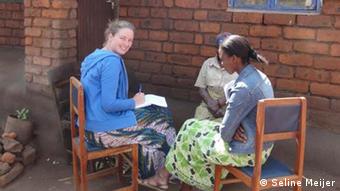 Seline Meijer, a postdoctoral researcher at University College Dublin, based her most recent research project - on if, how and why local farmers plant new trees in Malawi - in a gender approach. Deforestation in Malawi is a major problem: 30 percent of its forests have disappeared in the last 10 years.
Seline Meijer, a postdoctoral researcher at University College Dublin, based her most recent research project - on if, how and why local farmers plant new trees in Malawi - in a gender approach. Deforestation in Malawi is a major problem: 30 percent of its forests have disappeared in the last 10 years.
"It gives you a better understanding of what the situation is like on the ground," Meijer told DW. "There is a big difference in gender roles, and the benefits that people get from projects," she added.
In Malawi, tree-planting typically would fall to men. But when Meijer looked at gender roles and the impact women have, she was surprised to find that in the south of the country, more trees are being planted than in the north - due to different gender dynamics there.
In the north, households are traditionally led by men, and the decision on whether to plant trees is up to them. However, in the south women often head the household and family structures are traditionally matrilineal.
Even though the actual physical task of planting trees is carried out by men as in the north, the decision to plant trees is made differently in the south: It's either up to the women alone; or women and men make the decision together. In the end, this results in more trees being planted.
In this case, women can have a concrete impact on reforestation. This research finding will for example be helpful when setting up large-scale reforestation projects in Malawi.
Good for nature - and women
Thinking about gender when implementing conservation projects is not only beneficial for the environment, said Westerman - it also protects the women. "Each project will impact men and women differently," she pointed out.
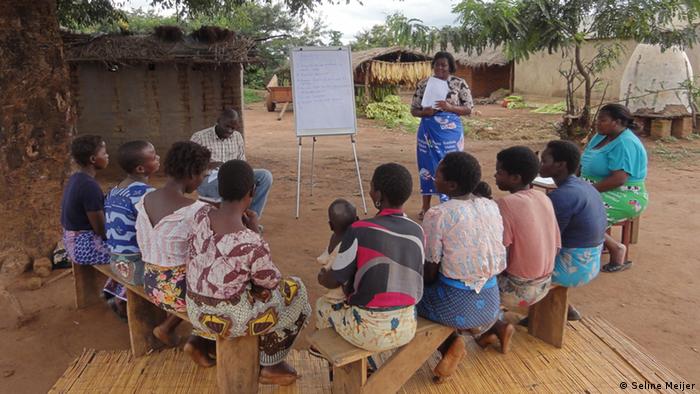
So how could a gender-sensitive project look? The first step, according to Westerman, is to understand gender dynamics - to understand whom is tasked with what, and how the community makes decisions.
To enable women participation in a project, it might also be necessary to organize childcare, provide additional education to women, or run workshops for men and women separately. "These are already small things we can do to help women participate," Westerman said.
Men still vital
"Sometimes when programs talk about gender, it almost becomes synonymous with 'women,' Meijer said. But it's crucial both genders continue to play a role, she added.
Westerman agrees, as men are important advocates: "At the end of the day, in many of these traditional cultures, unless men are on board, [the project] really won't go anywhere."
When being asked whether women would be better conservationists than men, if given more power, Westerman laughed out loud. She responded: "Women and men both have the potential to be amazing conservationists - our job is to ensure that both have the ability to be the best conservationists possible."
Date 02.04.2015
Author Ruth Krause
Source: Deutsche Welle
Opinion: Triumph for democracy in Nigeria
- Details
- Category: Current Issues
- Created on Wednesday, 01 April 2015 00:00
- Hits: 5781
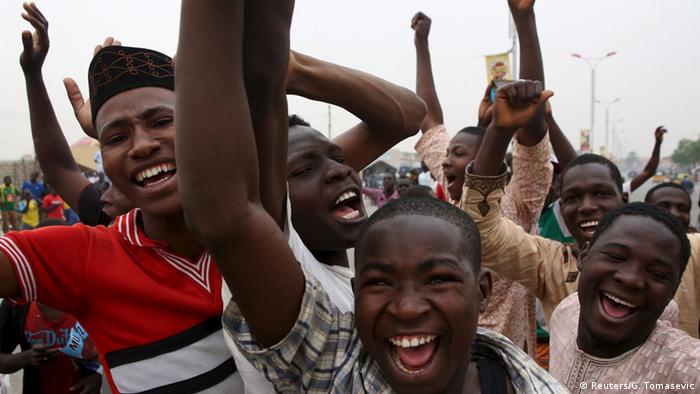 Opinion: Triumph for democracy in Nigeria
Opinion: Triumph for democracy in Nigeria
Muhammadu Buhari has won Nigeria's election. President Goodluck Jonathan has conceded defeat. The people of Nigeria have proved their democratic credentials, but Buhari has yet to pass the test, writes Thomas Mösch.
Nigeria deserves our congratulations. Not because Muhammadu Buhari is a particularly fortuitous choice, but because the country has succeeded in bringing about a change of government for the first time since its return to democracy. Until very recently most Nigerians - and many others besides - believed that the powerful ruling PDP would be able to win every election either by genuinely attracting support at the ballot box or by intimidation or manipulation. So if the transfer of power proceeds even relatively peacefully, Nigeria's democracy will have taken a big leap forward.
Why were things so different this time round? Firstly, because the major opposition parties joined forces to form an alliance. This alliance was able to agree on a joint presidential candidate in an unusually transparent and democratic selection process. This enabled Buhari to broaden his electoral appeal beyond his core Muslim supporters in Nigeria's north. This was true in particular of the densely populated southwest of the country, which includes the commercial capital Lagos.
Goodluck Jonathan has earned great respect by conceding defeat quickly and unambiguously. This is not something that one can take for granted either in Nigeria or elsewhere in Africa. Jonathan actually facilitated Buhari's victory. The outgoing president was never attuned to the needs of the people of northern Nigeria, as was shown by his lack of interest in tackling the Boko Haram insurgency. His resolve to defeat the terrorists only hardened when he saw an election victory slipping away. By neglecting to address insecurity year after year, he drove many Christians to vote for Buhari, a Muslim. Many of the villages which were invaded by Boko Haram were Christian. Most of the Chibok schoolgirls, kidnapped by the Islamist militants a year ago, were also Christian.
Many of the Christians in the northeast and in the central regions - where Muslim and Christian settlements border on one another - came to the conclusion that Jonathan, a Christian president, was unwilling or unable to offer them any protection.
Of all the protagonists in this election, the chairman of the Independent Electoral Commission (INEC), Attahiru Jega, deserves the most praise. The professor of politics has had to withstand enormous pressure over the last few weeks. The government, with the help of the military, forced him to postpone the election by six weeks. Politicians from Jonathan's camp called almost daily for his removal. Jega was alternately accused of being in cahoots with the opposition or of wanting to use unreliable new voting technology. Yet in spite of the chorus of protest in some quarters ahead of the poll, the election itself proved to be an orderly affair almost everywhere. Credible observers did not voice any fundamental criticisms of the vote.
INEC had a difficult job. This was shown by events in Rivers State in the Niger Delta. Jonathan's PDP had reportedly garnered 1.5 million votes whereas Buhari's APC had secured only 70,000. Yet the governor of the state defected to the APC months ago and became Buhari's campaign manager. Buhari himself was able to successfully launch his campaign in Port Harcourt, capital of Rivers State.
It is therefore hardly surprising the regional head of the electoral commission found himself fluffing his lines when reading the dubious results out loud. The courts may well find it necessary to scrutinize the outcome of the Rivers State poll.
Buhari will face tough challenges on taking over the reins from Jonathan. The Nigerian economy is largely dependent on the country's oil reserves. Public spending is financed almost entirely by oil revenue. As oil prices are low, these are difficult times for Nigeria. Boko Haram has not yet been defeated. Buhari, a northerner himself, may, however, find it easier to accommodate the aspirations of the north more easily than Jonathan. Hopefully, the ex-general will realize that a military victory over the militant Islamists is only part of the answer and that the northeast needs opportunities for development as well. The Niger Delta region - following Jonathan's defeat - is likely to present him with greater problems. The militants there had been pacified but not vanquished and were allowed to enrich themselves under Jonathan's rule. They will try to defend that which they claim belongs to them. Weeding out the corruption which flourished under Jonathan may well be one of Buhari's easier tasks. Things can really only get better.
From a broader perspective, Buhari will have to demonstrate that he really has become a true democrat. Even his respected predecessor Olusegun Obasanjo tended to adopt a military, authoritarian tone every now and again after he was elected in 1999. Human rights in Nigeria suffered as a consequence.
Date 01.04.2015
Author Thomas Mösch / mc
Source: Deutsche Welle
Better Cough GH¢51.2m – CJ Warns Woyome
- Details
- Category: Law & Justice
- Created on Wednesday, 01 April 2015 00:00
- Hits: 6666
 Better Cough GH¢51.2m – CJ Warns Woyome
Better Cough GH¢51.2m – CJ Warns Woyome
The Chief Justice, Georgina Theodora Wood, has warned embattled National Democratic Congress (NDC) bankroller, Alfred Kofi Agbesi Woyome, to refund the GH¢51.28 million he took from the state as judgment debt.
She told Woyome’s lawyer, Osafo Boabeng, during a hearing for an application filed by the Attorney General seeking directions from the Supreme Court to chase Woyome and Waterville for the cash, that in order “to avoid a higher crime, better pay”; to which counsel responded, “We are making efforts to pay the money” and promised that they would finish payment by the end of the year.
‘Higher crime’ is the offence, according to law, where one fails to comply with a Supreme Court order.
This order was read by Mrs Sophia Adinyira, one of the 11 panel members hearing the case, thus: “The charge of high crimes and misdemeanours covers allegations of misconduct peculiar to officials, such as perjury of oath, abuse of authority, bribery, intimidation, misuse of assets, failure to supervise, dereliction of duty, conduct unbecoming, and refusal to obey a lawful order. Offenses by officials also include ordinary crimes, but perhaps with different standards of proof and punishment than for non officials, on the grounds that more is expected of officials by their oaths of office.”
Justice Anin-Yeboah had asked counsel if he meant what he was saying, to which counsel said he meant every word of it and that he even had consultations with the A-G on the matter this year.
Earlier, the state, led by Dorothy Afriyie-Ansah, told the court that they were back to court seeking leave as to how to enforce the judgment because they were not seeing their way clear.
Martin Alamisi Amidu, the former A-G who initiated the action leading to the order for payment, said the state did not need the leave of the court if they had taken steps to enforce the judgment and urged the court to give reserve orders as to make the orders meaningful for the state to have them carried out.
Kofi Peasah-Boadu, counsel for Waterville, said he was opposed to the order for directions because judgment had not been ordered in respect of the court order against them. But Justice Jones Dotse reminded him that it was because of the time lapse and how to carry out the orders that the A-G was back to court seeking directions to enable them make the orders meaningful.
Mr Boabeng, on the other hand, stated that he did not understand why the state got what they wanted and were back to court seeking leave to enforce the judgment, to which Justice William Atuguba noted that the court was treating the application for leave as directions because the state admitted they were not seeing their way clear.
Justice Adinyira asked whether it was because the respondents had not obeyed the court order that was why he said he did not understand and counsel in response said they had no intention of disobeying the court, after which Mrs Adinyira read out the offence for failing to obey the court as higher crime.
Citizen Vigilante
Martin Amidu, before the judges rose for the chamber, admonished the A-G to execute the judgment expeditiously for people to have confidence in the judiciary and said if the orders were not obeyed, “I will be back to ensure that the court orders are not in vain”.
Other Justices on the panel were Julius Ansah, Baffoe-Bonney, Sule Gbadegbe and P. Benin.
It would be recalled that the Supreme Court, presided over by Chief Justice Georgina Theodora Wood, last year held that there was no contract between the state and businessman Alfred Agbesi Woyome regarding the CAN 2008 projects, and that the GH¢51.2 million judgment debt paid to the businessman was unlawful.
The apex court therefore ordered Woyome to refund the money, stressing that the basis of Woyome’s claims was in contravention of Article 181(5) of the 1991 Constitution which requires the approval of Parliament.
The court consequently held that consent judgment which the former Attorney-General, Betty Mould-Iddrisu, made with Woyome should have not been entertained at the High Court.
Woyome was three weeks ago acquitted and discharged on the offence of fraudulent receipt of the GH¢51.28m judgment debt by Justice John Ajet-Nassam.
By Fidelia Achama
Source: Daily Guide/Ghana
Forest sustainability certification gains ground
- Details
- Category: The World
- Created on Thursday, 12 March 2015 00:00
- Hits: 7741



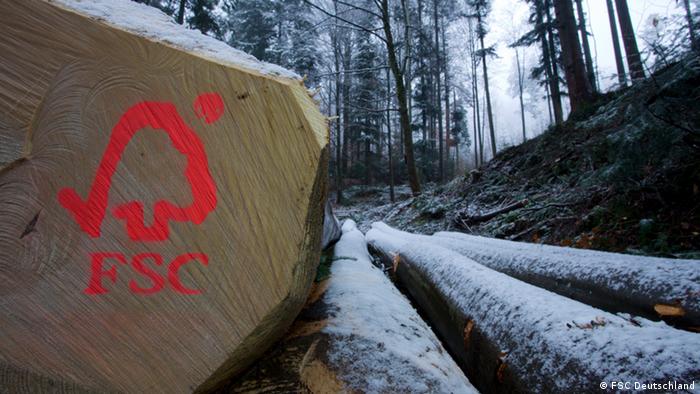 Forest sustainability certification gains ground
Forest sustainability certification gains ground